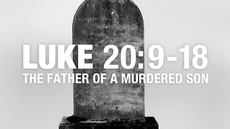The following post is adapted from this past week's sermon, "Jesus and Zacchaeus," part 78 in our sermon series on the Gospel of Luke.

And Zacchaeus stood and said to the Lord, "Behold, Lord, the half of my goods I give to the poor. And if I have defrauded anyone of anything, I restore it fourfold." And Jesus said to him, "Today salvation has come to this house, since he also is a son of Abraham. For the Son of Man came to seek and to save the lost."
Luke 19:8–10
Jesus called out to Zacchaeus and changed him forever. Here's the key about
what happened with Zacchaeus. It's a little equation:
repentance plus restitution equals rejoicing. Zacchaeus was guilty. Yet, Jesus forgives him.
Those who were present
grumbled, "That's not fair." But here's a great truth: Jesus not only forgives people, he changes them. Religious people don't get that. "How could he just forgive them?" Well, he doesn't just forgive them. He also changes them.
Christianity is not, "Do whatever you want and God will forgive you, or keep doing whatever you want and God will keep forgiving you." Christianity is you do what you want, then you meet Jesus, you realize what your were doing was sinful and wicked, and you realize that he, in fact, is Lord.
You don't want to continue sinning because something happens deep in you: Jesus changes you.
When Jesus called Zacchaeus, Zacchaeus called Jesus, "Lord." When Jesus changed Zacchaeus, Zacchaeus made restitution, giving half his wealth to the poor and paying back those he defrauded four times over. Zacchaeus didn't just repent. He also responded to Jesus's generosity with restitution.
What do repentance and restitution look like for you?
Because we can't just look at the story of Zacchaeus and say, "That's amazing!" We have to look at Zacchaeus and say, "That could be amazing for me, as well."
Here are eight questions to figure out what repentance and restitution that results in rejoicing looks like for you. These are for you to think about personally, to talk about with your family, and to discuss in your Community Group.
1. What have you taken that you need to give back?
Have you stolen anything?
You can't say, "Jesus forgives me." You have to say, "Jesus forgives me, and I have to give it back." Some of you, the people you stole from don't even know. Some of you would say, "It's not illegal! It was called bankruptcy." But you intentionally were fraudulent in your dealings with people. If you're intentionally trying to find a legal way to take money out of someone's pocket, it may be legal, but it might still be sinful.
What have you taken that you need to repay? See, if people really get the concept of restitution, hundreds of thousands of dollars are gonna come out of Mars Hill Church. Some of you say, "I can't afford it." You may need to sell your car. You may need to downsize your lifestyle. You need to make some serious changes as an act of repentance and restitution.
For each of you, t
he Holy Spirit is going to highlight one or more of these questions, something that is an action item for you. Yes, Jesus forgives. But what about that which you've stolen? Wouldn't it be good to pay it back?
And let me ask this:
if you were in the position of the victim, isn't that what you would want? If someone called you, said, "I became a Christian! He forgave all my sin! Thanks for letting me rip you off!" You would say, "You know, as the victim, that doesn't sit quite right." Now, as the victim, you could say, "I forgive you, as well. The debt is forgiven. I do not want repayment." You have that right. Or you could say, "Yes, I appreciate that offer, and I will receive it." As Jesus says, we should treat others as we would want to be treated.
2. How have you defrauded and what should you pay?
Here's an example. Are you the person at work who shows up late, leaves early, and in the middle spends a lot of time on Facebook and Twitter, watches a lot of YouTube videos, returns a lot of personal e-mails, and takes a lot of personal phone calls? That's defrauding your employer.
You say, "Everybody does it! It's not illegal!" Sure, it's not illegal, but it's sinful. Have you billed clients for hours you didn't work? Have you padded all of your billing? You're just like Zacchaeus.
Who have you defrauded? Are you that person who had a car that was a total piece of garbage, you totally knew it, and somebody came to buy it, they saw the fish on the back and asked you, "How does it run?" You're like, "Great."
You may say, "Oh, you know, hey, lemon laws, it's not illegal." But were you defrauding? Were you dishonest? You said, "If I tell them it's a lemon, they're not gonna buy it." I know. Maybe you shouldn't sell it. "But I won't get my money back." True, but you also wouldn't be defrauding someone.
How many of you have been defrauded? Somebody sold you something, but it wasn't the truth. Somebody billed you for something that wasn't honest. They charged you for something, and they padded it. We want to treat others the way we want to be treated.
3. When have you been lazy and what does it look like to change?
Have you neglected your duties to your family? To your employer? To your schoolwork? Whatever your "job" is? Have you been lazy, not doing your best, and defrauding others of good service?
Some of you don't work hard, you don't work a lot, and you can't keep a job.
Some of you don't work toward progress, you just sort of settle in. You've learned at your job, "If I just don't get in trouble, don't do anything crazy, hide over here in the corner, I can sort of just milk this job."
What does it look like for you to change?
4. Whom have you neglected and what does your restitution require?
We often steal from people. We steal memories, we steal friendship, and we steal joy. Grace and I just finished the marriage books and sent off the final edits, and in it, we tell a story in there from a counseling appointment a long while ago.
A husband and wife had been married for a long time, and there hadn't been adultery or divorce, but there hadn't been friendship. I asked her, "What do you want?"
She said, "I want him to sit on the couch and talk to me for twenty or thirty minutes a day. Is that unreasonable?"
"No," I said, "How long you been waiting?"
"Forty years."
"You've been waiting on the couch after dinner every day for forty years?"
"Yes, and he never sits down and visits with me."
Now, he might say, "That's not illegal!" But it's sinful. And he's stolen thousands of hours from his wife. Some of you, you don't have date night, you don't court your spouse, you don't spend time with your kids, you don't go to their events, you don't do a lot of things that no one would arrest you for,
but you've stolen memories, you've stolen hope, you've stolen encouragement, and you've stolen joy. Some of you have intentionally sabotaged birthdays and holidays, or made vacations miserable. You've stolen. You've stolen joy and friendship and community and life.
And what does restitution require? What does it look like to say you're sorry and try to, in as much as you're able, do right and make up for it?
5. Which sinner have you not called out, but only grumbled about?
Zacchaeus is a sinner, everybody knew it, and they all talked about him. Jesus called out to him, and they grumbled. Who do you gossip about? Who do you talk about? "They drive me crazy. They're driving me nuts. They're so horrible." Have you talked to them? "No."
Maybe you should call them out, like Jesus called Zacchaeus out. "Look, I love you. I'm frustrated with you, and here's the truth. We need to deal with this. I'm calling you out. I'm calling you into friendship, but a friendship in which you're going to make some changes thanks to Jesus."
Who do you need to talk to? It may be fear of man or laziness on your behalf, but how have you acted like the crowd instead of like Jesus?
Everybody knew Zacchaeus had a problem. Only one person talked to him.
6. What joys have you stolen and need to repay?
This goes back to point four. I know parents who have missed their kids' birthdays. I know parents who have missed important seasons and moments and opportunities in their kids' lives. Not because they had to, but just because they chose to. Maybe you say,
"I'm not organized, I'm not sentimental, I'm not romantic, I'm not considerate." What you should say is, "I'm unrepentant." And maybe you should figure out what repentance and restitution looks like.
7. What sins have you tolerated, and what does repentance look like?
Zacchaeus tolerated the sin in his life for a long time. It takes more than a few years to become the chief tax collector and very rich. What have you accommodated, accepted, and tolerated for a long time? Today's the day you need to say, "Yeah, that needs to die. My back needs to turn on it, and my face needs to turn toward him."
8. Have you been greedy and, if so, what does it look like to be generous?
Have you been greedy? When you get, do you increase your standard of giving—or just your standard of living? Have you played that myth, "As soon as I get out of this hole, then I'm gonna be generous"? And you get out of that hole to get into another hole? Because you've not had repentance. You've not practiced restitution.
Have you been greedy?
Generosity, friends, should start with our family, should extend from there to the work of God, and to the poor. Some of you say, "I knew this is where it was going. He wants my money."
I don't want your money; I want you to have joy. Zacchaeus was a miserable man and then he met Jesus, then he changed. And he rejoiced and his generosity enabled others to rejoice. And
the Bible says that we are more blessed—this is from the lips of Jesus—it is more blessed to what than what? To give than receive.
Jesus is the biggest giver. Jesus is the most joyful. And Jesus wants us to receive from him the gift of eternal life, the forgiveness of sins, and to participate with him and his work on the earth of being generous that we might share in his joy. That's why
the Bible says that God loves a cheerful giver. If you're reading this today and you say, "You know what? I am unwilling to have any alteration in my standard of living, my financial security."
Tragically, what you're saying is, "I choose my idol, and I reject Jesus." We don't want that for any of you.
Jesus comes to seek and save the lost
Jesus says to Zacchaeus, "Today, salvation has come to your house."
Let me invite you, today salvation could come to your house. Receive Jesus as Savior and friend.
And Jesus
says, "For the Son of Man came to seek and to save the lost."
Some of us are lost.
Some of you are lost.
At one point I was lost.
And Jesus comes today to seek and save you.
Jesus comes to call out to you.
And in the story he's on his way to the cross where he's going to pay your debt and give you the gift of God as a friend. That's our Jesus.













